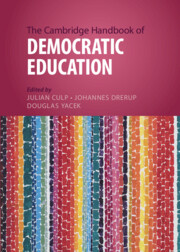Book contents
- The Cambridge Handbook of Democratic Education
- Cambridge Handbooks in Education
- The Cambridge Handbook of Democratic Education
- Copyright page
- Contents
- Contributors
- Acknowledgments
- Introduction
- Part One Historical Perspectives
- Part Two Philosophical and Normative Foundations
- Part Three Key Topics and Concepts
- Part Four Challenges
- 26 Wealth Stratification in US Higher Education and Democratic Education, 1890s–2020s
- 27 Mentoring and Instructional Duties of Professors
- 28 Racism, Moral Transformation, and Democratic Education
- 29 Postcolonial Perspectives on Democratic Education
- 30 Populist Challenges to Democratic Education
- 31 Religion and Democratic Education
- 32 The Epistocratic Challenge to Democratic Education
- 33 Climate Change and Democratic Education
- 34 The COVID-19 Pandemic and Democratic Education
- 35 Teacher Neutrality, Pedagogical Impartiality, and Democratic Education
- Index
- References
32 - The Epistocratic Challenge to Democratic Education
from Part Four - Challenges
Published online by Cambridge University Press: 20 April 2023
- The Cambridge Handbook of Democratic Education
- Cambridge Handbooks in Education
- The Cambridge Handbook of Democratic Education
- Copyright page
- Contents
- Contributors
- Acknowledgments
- Introduction
- Part One Historical Perspectives
- Part Two Philosophical and Normative Foundations
- Part Three Key Topics and Concepts
- Part Four Challenges
- 26 Wealth Stratification in US Higher Education and Democratic Education, 1890s–2020s
- 27 Mentoring and Instructional Duties of Professors
- 28 Racism, Moral Transformation, and Democratic Education
- 29 Postcolonial Perspectives on Democratic Education
- 30 Populist Challenges to Democratic Education
- 31 Religion and Democratic Education
- 32 The Epistocratic Challenge to Democratic Education
- 33 Climate Change and Democratic Education
- 34 The COVID-19 Pandemic and Democratic Education
- 35 Teacher Neutrality, Pedagogical Impartiality, and Democratic Education
- Index
- References
Summary
One of the most fundamental challenges to democratic education is the “epistocratic” challenge. According to proponents of epistocracy, the ordinary citizenry is too stupid, irrational, and demotivated to vote intelligently and better-quality government would result if the franchise were restricted to a small elite of the best informed, most rational, and best-motivated citizens. If correct, epistocracy would imply that many of the ideals of democratic education are misplaced and that the educational practice of preparing all citizens to vote would be pointless. In this chapter, I review the theory of epistocracy as it is presented in the work of historical and contemporary philosophers from Plato and John Stuart Mill to Bryan Caplan and – most notably – Jason Brennan. I also discuss the implications of epistocracy for democratic education. I hold that, even if Brennan is right that the franchise should be restricted to a small cognitive elite, the question of how one should educate that elite becomes even more important. In the final analysis, I hold that Brennan’s scheme for ensuring that the cognitive elite is representative of society will require a broadening of political education opportunities that will result in a reintroduction of a democratic form of education through the epistocratic back door.
- Type
- Chapter
- Information
- The Cambridge Handbook of Democratic Education , pp. 550 - 573Publisher: Cambridge University PressPrint publication year: 2023

